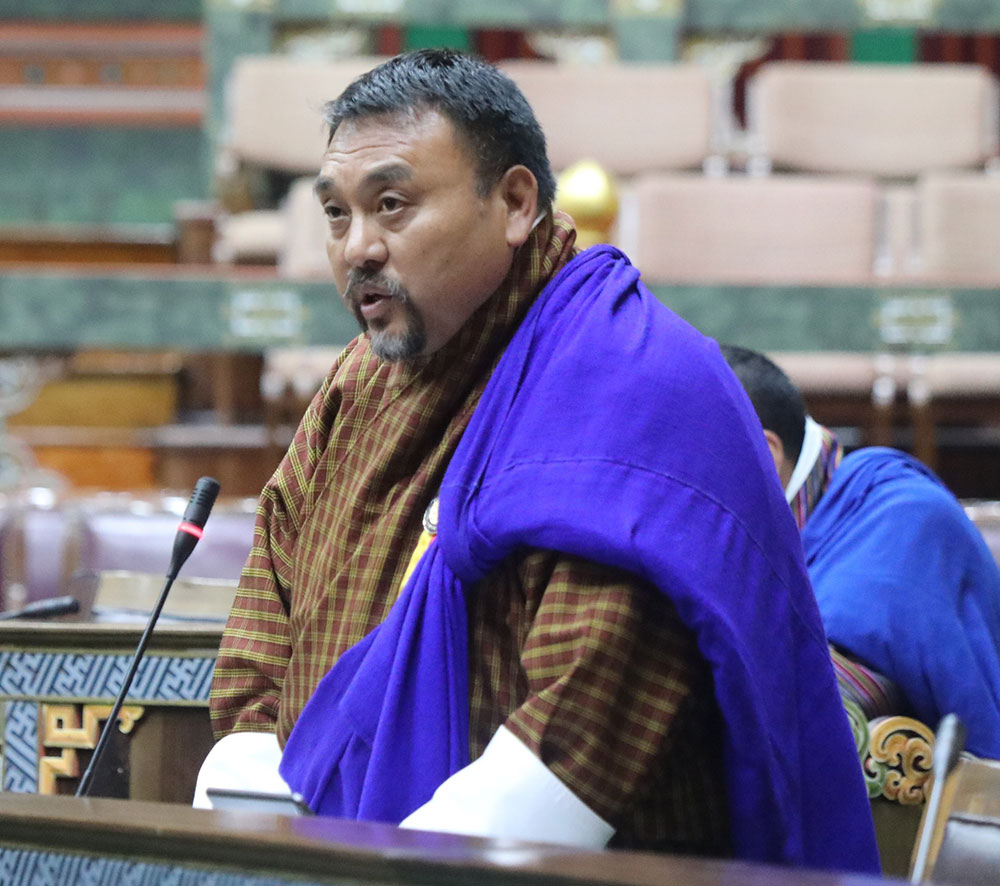The Pay Structure Reform (Amendment) Bill to be tabled in summer session next year
Thukten Zangpo
The Economic and Finance Committee (EFC) moved the motion to table the Pay Structure Reform Act (Amendment) Bill during the summer session of the National Assembly next year. The motion was adopted by the House yesterday with 32 in favour, seven abstentions, and two ‘no’ votes.
The committee proposed a motion recommending the government to table the Pay Structure Reform Act of Bhutan 2022 and other associated acts such as Civil Service Reform Act 2022 for comprehensive review and amendment.
On behalf of the committee, the member of EFC and Mongar MP Naiten Wangchuk outlined several inconsistencies in the existing laws, which affect parliamentary entitlements, civil service benefits, and allowances for embassies, missions, consulates general (EMC).
He said that provisions in the Pay Structure Reform Act 2022 and the Pay Revision Act 2023 are in direct conflict with both the National Assembly Act 2008 and the Parliamentary Entitlement Act 2008, as well as Article 20 (8) of the Constitution, which prohibits executive orders or notifications that contradict parliamentary legislation.
He added that the finance ministry’s notification also contravened the Article 20 (8) of the Constitution, which states, “The Executive shall not issue any executive order, circular, rule or notification which is inconsistent with or shall have the effect of modifying, varying or superseding any provision of the law made by the Parliament or a law in force.”
Naiten Wangchuk said that the Pay Act 2022 and 2023 caused inconveniences to the civil servants mostly related to leave and allowances both within and outside the country.
The committee found issues like prorated leave encasement, mandatory annual leave, reduced daily subsistence allowances, removal of vehicle and duty-free quotas, fluctuating exchange rates for foreign allowances, and limited access to affordable healthcare for EMC staff.
“Prior to the enactment of Pay Structure Reform Act 2022, there was a provision to encash leave if it was not availed. For now, all entitled payments for leave are prorated. Besides, they are made to take mandatory leave for 21 days annually thus affecting the critical agencies such as hospitals that are already short of human resources,” Naiten Wangchuk said.
The committee also pointed out that the 20 percent reduction in daily subsistence allowance (DSA) for officials accompanying ministers and their equivalents violates the constitutional and legal requirement of equal pay for equal work.
MPs also raised concerns about ineligibility of DSA where travel within the gewog and any travel more than 10 kilometres where night halts are made at the place of origin.
The committee is urging the government to reinstate vehicle and duty-free quota entitlements, which were removed as part of the pay reforms. These entitlements, previously seen as a form of recognition for civil servants’ service, were eliminated under the current pay structure.
“This could possibly delay delivery of services and also demotivate the civil servants,” Naiten Wangchuk said.
Currently, overtime payments are only provided to civil servants in Grade S5 and below, even though employees in higher grades also frequently work additional hours. The committee recommended that overtime pay be extended to all civil servants, regardless of grade, to ensure fair compensation for extra work.
The committee also recommended for communication allowances which were discontinued with the Pay Revision Act 2023. “While not all professions may need communication allowances, those reliant on information technologies for coordination and periodic information sharing should be considered for communication allowance,” the committee stated.
The Committee reported that EMC staff have also been disproportionately affected by the recent pay reforms. With all foreign service-related allowances converted to US dollars, these employees are facing reduced allowances due to fluctuating exchange rates.
Furthermore, EMC staff have been unable to access healthcare benefits because of their inability to afford co-payments for insurance. The committee recommends that these issues be addressed urgently, as they have a direct impact on the morale and welfare of those serving abroad.
Naiten Wangchuk said that these challenges have demotivated public servants, disrupted critical services, and hindered the implementation of the 13th Plan.
The chairperson of the EFC and Bartsham-Shongphu MP Rinchen Wangdi suggested that allowances be integrated into basic pay to benefit pension plans and simplify the system. He stressed that the reforms should seek to restore civil servants status to pre-pandemic conditions by encouraging and retaining talented personnel.
Khamdang-Ramjar MP Namgay Dorji said that 20 percent DSA is not adequate while going abroad and it’s time for revision. He also said that vehicles are necessary and vehicle quota needs to be reinstated.
The House directed the relevant committee of the National Assembly to review the Civil Service Reform Act 2022.
The discussion yesterday also touched on the constitutionality of amendment of the Pay Structure Reform Act, which brought to attention particularly to Article 30 of the Constitution on formation of Pay Commission and its authority to revise the structure of the salary, allowances, benefits, and other emoluments.


